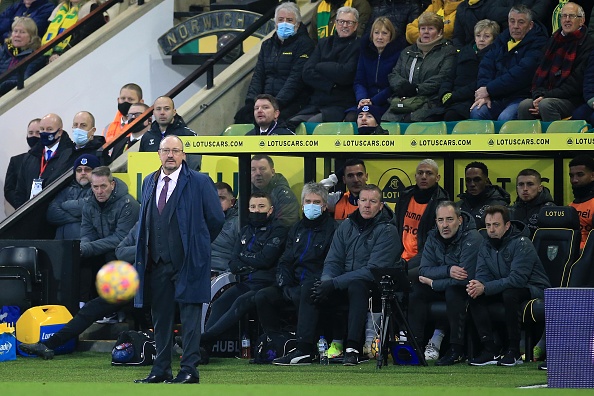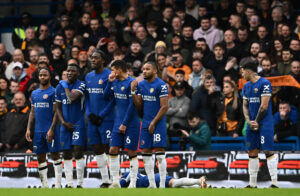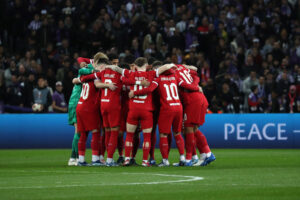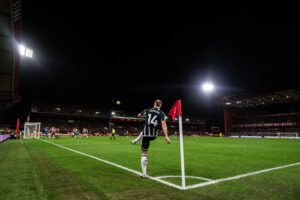In perhaps the most unsurprising turn of events this season, Rafael Benitez was sacked by Everton last weekend following a dismal spell in charge of the club. He joins a short list of managers who looked to play both sides of a local derby in English football.
Rafa Benitez: The Latest to Discover That Football Fans Don’t Forgive or Forget
Rafael Benitez Gets the Boot
One could argue that injuries, COVID and the general incompetence at Goodison Park played its part but in truth the partnership was doomed from day one.
Hardly a shock. “Agent Rafa” is a beloved figure in Liverpool history having spent five years on the red side of Merseyside.
Rafael Benitez is the man who brought the European Cup back to Anfield. He’s also the man who called the Toffees a “small club” back in 2007. It was never going to work, and it’s unlikely to for Antonio Conte at Spurs either but for different reasons. But who are the other managers to cross the derby divide?
Brian Clough – The Man, the Myth, the Legend
Probably the only man to ever do it and achieve universal legendary status, unlike Rafael Benitez – Clough is responsible for the first league title in Derby County (1971/72) and only title in Nottingham Forest (1977/78) history. He also won back-to-back European Cups with Forest (1979, 1980) – manager or miracle worker?
Both clubs have statues of “Old Big ‘Ead”. Enough said.
Those to follow his career plan in the Premier League years have been more Benitez than Brian, so let’s save Clough the ignominy of further association with this list.
George Graham – The King of the North (London Derby)
Having previously played for them, George Graham became the manager of Arsenal in the summer of 1986.
The Gunners had been in a state of decline preceding his arrival, but under the Scotsman the club would enjoy one of their most successful periods – six trophies came in his eight years at Highbury, including two league titles.
His time at the club also saw the now-famous “1-0 to the Arsenal” chant first coined, such was the ultra-defensive approach in later seasons.
He was acrimoniously sacked in 1995 after being found guilty of accepting illegal payment during the transfer of players. He has always denied any wrongdoing.
After a year-long ban and two spent at Leeds United, Graham, perhaps seeking revenge, took over at Tottenham Hotspur in the autumn of 1998.
The League Cup would again come to North London in 1999, one of only two trophies for Spurs in the last 31 years, but the club remained in mid-table mediocrity.
Never popular with fans given his Arsenal past and still-boring football, few tears were shed when Graham was sacked by new owners ENIC, fronted by Daniel Levy, in March 2001.
Harry Redknapp – Part 1: London Calling
The first of our multi-derby entrants, Redknapp landed his first top-flight job at West Ham in 1994 after cutting his teeth with Bournemouth. He had spent the vast majority of his playing career at these two clubs.
Redknapp built a fashionable side with the mercurial Paolo Di Canio the Pied Piper of an all-star academy cast of Rio Ferdinand, Joe Cole, Michael Carrick and Frank Lampard, his nephew – a 5th placed finish in 1998-1999 the peak of his seven years in the East End.
In May 2001, ‘Arry was surprisingly sacked following a disagreement over transfer funds with the club’s board.
He would find his way back to London just over seven years later when he took up the reigns at rivals Spurs following the early season departure of Juande Ramos from the Lane.
Within 18 months, Redknapp would take Spurs into the Champions League for the first time, taking on Europe with an exhilarating side starring Gareth Bale, Luka Modric, Rafael Van Der Vaart and old favourites Peter Crouch and Niko Kranjčar.
Despite a second 4th place finish in 2011/12, he was dumped in London again as Spurs’ spot in the Champions League was nabbed by Chelsea following their winning of the competition.
Part 2: A South Coast Sojourn
In between London living, Redknapp would relocate to the south coast with two successful stints with Portsmouth coming either side of a strange spell with rivals Southampton.
After leaving West Ham, Redknapp moved down a league with Portsmouth in 2001, first as Director of Football and then as manager.
Promotion as champions came in 2002-2003, the club’s first to the top flight in 15 seasons.
Premier League stability was secured with relative comfort as Fratton Park became a fortress of sorts – “Play up Pompey” being the soundtrack to success.
All seemed well. Until it wasn’t. Early into 2003/2004, Redknapp left the club as a result of several disagreements with chairman Milan Mandaric.
What came next was unthinkable. Weeks later, Redknapp committed the cardinal sin and moved down the road to Southampton.
Alongside his son Jamie, he battled in vain to keep Saints up as the club suffered relegation after a 27-year spell in the top division.
Redknapp resigned after a year despite the appointment of a world-class coach to his staff. A rugby coach that is – Sir Clive Woodward became the club’s performance director in 2005. Obscure.
Perhaps thinking “better the devil you know”, the prodigal son returned to Fratton Park, where back to back top 10 finishes and the 2008 FA Cup came before he left for Spurs.
In a fact that will surprise few, Peter Crouch worked under Redknapp in all three of these south coast stints, on top of their time together at Spurs. Crouchy was bought and sold three times by his perennial gaffer in this period. Here for a good time, not a long time (x3).
Jose Mourinho – Blue is the Colour, Lillywhite is Not
Jose Mourinho first landed in English football in the summer of 2004, anointing himself “The Special One”. He lived up to it.
Setting new standards in England, two titles, two league cups and the FA Cup came from 2004 to 2007, also remaining unbeaten at home in the league during this time.
He departed early into the 2007/2008 season following a fallout with owner Roman Abramovich – this would become a pattern for both men.
After more success with Inter Milan and Real Madrid, Jose made a shocking return to West London in 2013 for his second act.
Another title and league cup was delivered in 2014/15 but frictions would again soon surface, as Mourinho went into full self-sabotage mode, picking fights with everyone, including the club’s team doctor.
The follow up to his third league title at the club (50% of the club’s overall total) flamed out spectacularly and he was sacked for a second time in December 2015.
With his love affair firmly over with Chelsea, his standing with the fans diminished as he moved to Manchester United in the summer of 2016 and worse, to cross-London rivals Spurs in October 2019.
If Chelsea fans were dismayed, Spurs’ were even more so – Daniel Levy had replaced the much loved Mauricio Pochettino with the loathed Jose in a desperate search for trophies.
This didn’t work out. By now, Mourinho was past his best and out of touch with the modern game and despite being top of the table in December 2020, he was sacked for a fourth time in his Premier League career just a few months later. Like Rafael Benitez, Mourinho was doomed from the get go.
He now manages Roma, the newly established scrap heap of Premier League football.
Alex McLeish – The Second City Scoundrel
After a highly successful management career in Scotland, McLeish moved down south, taking the Birmingham City post in November 2007.
Two relegations, a promotion, a 9th placed finish and the League Cup, won in dramatic fashion against big favourites Arsenal in 2011, came in just under four years.
Following this second relegation, McLeish tendered his resignation through email. Classy.
Just five days later, and not fancying packing furniture, McLeish became the new manager of Aston Villa, an announcement which went down like a lead balloon across the city.
A dull style of play and a club record low of four home league wins meant sayonara for the Scotsman at the end of the 2011/12 season.
It’s up for debate if he’s returned to the second city since.
Steve Bruce – Loyalty? Never Heard of It
The last member of this motley crew and our only three-time entrant.
Steve Bruce has managed on both sides of the Sheffield and Birmingham derbies but his most recent two-timing came in his native North-East.
A life-long Newcastle fan, he forget that affiliation in 2009 when he shacked up with Sunderland.
His time as a Black Cat got off to a successful start as he achieved the club’s highest league finish in 10 years in 2010/11.
Unfortunately Bruce didn’t have nine lives and couldn’t survive the subsequent season’s poor form, leading to his dismissal in November 2011.
Eight years may have passed by the time he finally landed his supposed dream job, but the Toon Army hadn’t forgotten his past fling with the neighbours.
Following in the footsteps of our old pal Benitez and viewed perhaps slightly unfairly as a symbol of the Mike Ashley reign, Bruce struggled to win over many Newcastle fans in his two and a bit seasons in charge.
He was evicted after the Saudi takeover, probably to his own relief.
Rafael Benitez is the latest to learn the hard way about crossing the divide, but he certainly won’t be the last, and he certainly wasn’t the first.
Main Photo
Embed from Getty Images






